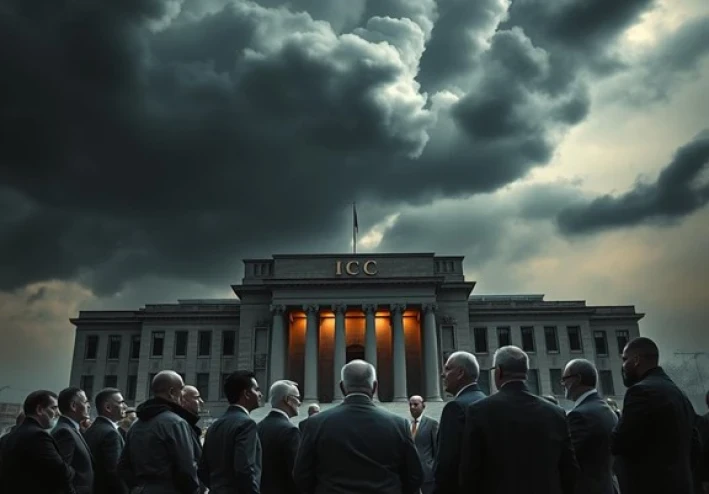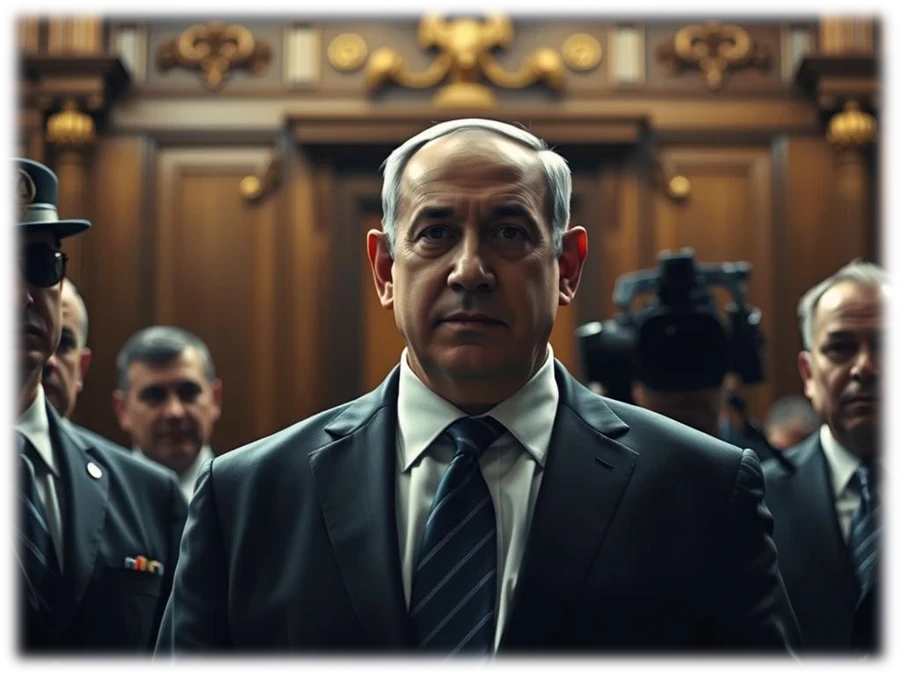
Netanyahu’s Arrest Warrant: Implications for Israel and the Framework of International Law?
Netanyahu’s Arrest Warrant: Implications for Israel and the Framework of International Law?
The issuance of an arrest warrant for a prominent political figure has ignited widespread controversy prompting significant
discourse surrounding its potential ramifications for Israel and the international legal order.
This legal action extends far beyond the individual targeted—it signals a pivotal moment for Israel’s diplomatic and legal standing on the global stage.
As governments and institutions worldwide weigh in, the situation continues to unfold under intense international scrutiny.
Understanding the legal foundations of the warrant and the broader consequences it may carry is essential.
This article explores those dimensions in depth to provide a comprehensive view of the unfolding developments.
A Precedent-Setting Action: ICC Issues Arrest Warrant for Netanyahu
The International Criminal Court’s (ICC) decision to issue an arrest warrant against Israeli Prime Minister Benjamin Netanyahu marks a profound escalation in its investigation into alleged war crimes. It represents not only a bold legal maneuver but also a significant turning point in the complex interplay between international justice and sovereign state actions.
This move has intensified discussions about the scope and power of international legal mechanisms and how they intersect with state leadership and military operations.

Timing and Political Context Behind the Warrant
The timing of the ICC’s announcement adds a complex layer to its legal gravity.
Issued amid heightened tensions in the region the warrant coincides with ongoing investigations into the recent Gaza conflict
suggesting a deliberate and possibly strategic moment chosen by the court.
Analyzing the context and motivations behind the timing offers insight into the legal and political calculus that may have guided this decision.
The Charges: Netanyahu and Israeli Officials Under Scrutiny
Netanyahu faces charges stemming from alleged war crimes committed during the conflict in Gaza—charges that are part of a broader investigation into the conduct of Israeli leadership during the hostilities.
According to the ICC prosecutor these charges underscore the court’s intent to hold even the highest-ranking officials accountable under international law.
The announcement has fueled a divisive global debate over the ICC’s jurisdiction
the quality of the evidence presented and the potential precedent this sets for holding national leaders to account for military actions.
A History of Tension: Israel’s Fraught Relationship with the ICC
This legal confrontation is not an isolated event but rather the culmination of a longstanding strained relationship between Israel and the ICC.
Israel's Non-Membership and the ICC: A Legal and Political Rift
One of the central points of contention between Israel and the International Criminal Court lies in Israel’s refusal to ratify the Rome Statute—the foundational treaty of the ICC.
This decision reflects deep-rooted skepticism within Israeli political and legal circles about the court’s jurisdiction impartiality and potential susceptibility to political influence.
Israel’s non-membership places it among a select group of countries that have declined to formally join the ICC often citing concerns about national sovereignty and the risk of politicized prosecutions that could undermine a nation's ability to defend itself.
Previous Investigations and Israel’s Legal Pushback
This is not the ICC’s first attempt to investigate Israel for alleged war crimes.
The court has previously launched inquiries particularly regarding military operations in the Gaza Strip.
These efforts have consistently been met with strong resistance from Israeli officials
who argue that the ICC lacks authority over a country that is not a party to its treaty.
Despite these objections, the ICC has persisted citing its jurisdiction over alleged crimes committed on the territory of Palestine which has been recognized as a member state.
This persistent legal back-and-forth has only deepened the rift between the two entities and continues to complicate international legal discourse on the matter.
Legal Framework: How the ICC Asserts Jurisdiction Over Israeli Officials
To understand the scope of the ICC’s actions it is vital to examine the legal mechanisms it employs to assert jurisdiction—especially over individuals from states that have not ratified its founding treaty.
While Israel is not a signatory to the Rome Statute the Palestinian territories—specifically the State of Palestine—acceded to the treaty in 2015.
This has provided the ICC with a legal foundation to investigate alleged crimes occurring in those areas, including actions taken by Israeli officials in Gaza.
Gaza as Legal Ground: Territorial Jurisdiction and Its Implications
Gaza represents the epicenter of the ICC’s current investigation. The court asserts that because Palestine is a recognized member of the Rome Statute it holds the right to investigate any crimes committed on its territory—even by officials from non-member states such as Israel.
This interpretation has opened the door for scrutiny of military operations conducted by Israeli forces in Gaza
and has become a cornerstone of the legal reasoning used by the ICC to move forward with the charges.
The Rome Statute and the Definition of War Crimes
At the heart of the ICC’s authority lies the Rome Statute which defines the crimes under its jurisdiction.
These include war crimes such as the willful killing of civilians, torture and destruction of civilian infrastructure not justified by military necessity.
The charges brought against Netanyahu and other officials are grounded in these definitions
with the prosecutor citing actions during the Gaza conflict that may have violated these core provisions.
Complementarity: The ICC’s Last Resort Mandate
A key principle underpinning the ICC’s operations is complementarity—the idea that the court only intervenes
when national legal systems are either unable or unwilling to prosecute crimes themselves.
In the case of Israel the ICC is scrutinizing whether the country's judicial institutions have adequately investigated and prosecuted potential war crimes.
If the court deems domestic efforts insufficient or lacking independence it reserves the right to proceed with its own legal actions.
This principle serves both as a check on international overreach and as a safeguard ensuring justice when national systems fall short.
Its application to Israel is particularly contentious as Israeli authorities maintain that their judiciary is fully capable of investigating such matters internally.
Navigating the Legal and Diplomatic Minefield
The ICC’s pursuit of Netanyahu represents more than just a legal milestone—it highlights the tension between international legal institutions and state sovereignty.
It also sets the stage for a broader examination of how wartime conduct is assessed prosecuted and politicized in today’s global arena.
The Evidence Behind the ICC’s Case: War Crimes and Humanitarian Impact
The ICC prosecutor’s call for Netanyahu’s arrest is supported by what is described as compelling evidence of war crimes committed during the recent conflict in Gaza.
Central to this case are accounts documenting widespread humanitarian devastation extensive civilian casualties and targeted destruction of civilian infrastructure.
The Gaza Humanitarian Crisis: A Central Element of the Charges
The conflict in Gaza has resulted in a deeply troubling humanitarian situation.
Civilian populations have borne the brunt of the violence with the ICC citing reports of indiscriminate attacks on residential areas schools, hospitals, and essential infrastructure.
These incidents are presented not merely as collateral damage but as possible violations of international humanitarian law—particularly the principle of distinction which obliges parties to a conflict to differentiate between combatants and non-combatants.
Civilian Deaths and Infrastructure Devastation
According to the evidence submitted by the ICC, the destruction during the Gaza conflict was not limited to military targets.
Civilian structures, including health facilities and educational institutions were reportedly either damaged or completely destroyed.
The high number of civilian deaths especially among women and children has added urgency to the court’s investigation.
These findings contribute significantly to the ICC's claim that Israeli actions may have gone beyond legitimate military self-defense and entered the realm of disproportionate use of force—an element that qualifies as a war crime under the Rome Statute.
Israel’s Self-Defense Argument: Security vs Legal Accountability
In its defense Israel maintains that its military operations in Gaza were necessary and proportionate responses to continuous rocket fire and attacks from Hamas and other militant groups. Israeli officials argue that the actions of the Israeli Defense Forces (IDF) were carried out within the bounds of international law and were aimed strictly at neutralizing security threats.
“The Israeli government has a duty to protect its citizens from existential threats” a senior official stated emphasizing that the conflict was triggered by relentless attacks from Gaza-based militants.
However the ICC prosecutor contends that even if Israel was exercising its right to self-defense the conduct of its military operations—particularly the scale and intensity of force used—must still conform to international legal standards. The prosecutor alleges that Israel may have failed in this regard especially in minimizing civilian harm.
Israel Responds: Legal Political and Diplomatic Pushback
The announcement of the arrest warrant was met with fierce opposition from the Israeli government
which condemned the ICC’s move as politically charged and legally unjustifiable.
A prominent Israeli official characterized the decision as “a dark day for international justice” warning that it undermines
Israel’s right to defend its people and risks setting dangerous precedents for how democratic nations are treated by international legal institutions.
Prime Minister Netanyahu himself issued a strong rebuttal declaring that Israel’s actions in Gaza were lawful and necessary.
He accused the ICC of bias and of attempting to criminalize the actions of a democratic state defending itself from terrorism.
At the same time Israeli diplomats have been mobilizing international support
reaching out to allied governments and institutions in an effort to counter the ICC’s narrative and to delegitimize the arrest warrant on the world stage.
Domestic Political Fallout: The Warrant’s Impact Inside Israel
The issuance of the ICC arrest warrant has sent shockwaves through the Israeli political landscape.
While Netanyahu’s administration has publicly rallied against the decision the development has further polarized domestic opinion intensifying
tensions between the government and opposition parties.
Critics within Israel accuse Netanyahu’s leadership of exposing the country to unprecedented legal and diplomatic isolation.
They argue that certain military decisions taken during the Gaza conflict lacked strategic foresight and have now triggered a global legal backlash.
Conversely a sizable portion of the Israeli public and political establishment has closed ranks in support of the government.
Many see the ICC’s actions as an attack on Israel’s sovereignty and its right to self-defense—galvanizing nationalist sentiment and reinforcing political unity at least temporarily.
Exploring Legal Countermeasures: Israel’s Strategic Response

In parallel with its political and diplomatic efforts Israel is reportedly considering a range of legal countermeasures aimed at challenging the legitimacy of the ICC’s decision. Among the potential steps are efforts to contest the court’s jurisdiction, particularly its authority over non-member states such as Israel.
Legal experts have also speculated that Israel may attempt to take action against ICC officials themselves including legal filings in other jurisdictions or appeals to alternative international legal bodies. The goal of such maneuvers would be to delegitimize the warrant and disrupt its enforcement.
These legal efforts reflect Israel’s broader strategy to frame the ICC’s move as not only flawed, but also as part of a politically motivated campaign targeting the Jewish state.
Divided Reactions on the Global Stage: A Fractured International Community
The ICC’s decision to pursue an arrest warrant for Netanyahu has elicited sharply contrasting responses from around the world.
These varied positions reflect deep geopolitical divides and differing interpretations of international justice.
Support for the ICC: Upholding Accountability
A number of countries particularly in Europe have welcomed the ICC’s action as a bold and necessary step toward ending impunity for alleged war crimes.
Human rights organizations have echoed this sentiment arguing that no leader should be exempt from legal scrutiny—regardless of their position or the politics involved.
These advocates view the warrant as an affirmation of the principle that international law must apply equally to all including leaders of powerful nations.
They argue that such measures are vital to maintaining the credibility and effectiveness of international legal institutions.
Strong Opposition: Allegations of Bias and Politicization
On the other end of the spectrum several countries—most notably the United States—have harshly criticized the ICC’s move U.S officials labeled the warrant as “deeply flawed,”
“Politically motivated” and “an affront to Israel’s right to defend itself”
This camp sees the ICC’s intervention as overreach contending that it sets a dangerous precedent for targeting democratically elected leaders engaged in national defense. Their stance underscores long-standing skepticism toward the ICC’s role and legitimacy particularly in conflict zones involving Western allies.
Neutral and Cautious Voices: Calls for Dialogue
Some nations have chosen a more balanced approach expressing neither full support nor outright condemnation of the warrant.
These governments have called for restraint dialogue and a diplomatic path forward emphasizing
the importance of international law while also stressing the need to avoid escalation.
Statements from this group often urge all parties to recommit to peace negotiations
and humanitarian principles viewing legal action as just one piece of a broader solution to the ongoing conflict.
The United Nations' Position: A Call for Accountability
While not taking a formal position on the warrant itself the United Nations has acknowledged the ICC’s role and reiterated the importance of accountability in times of war.
UN officials have emphasized that respect for international law is critical in resolving armed conflicts and preventing future atrocities.
The UN's reaction underscores its broader commitment to the principles of justice and human rights even as it seeks to maintain neutrality in highly politicized legal cases.
Practical Implications: Travel Diplomacy and Legal Exposure
Beyond the symbolic weight of the ICC arrest warrant there are concrete consequences that could significantly limit Prime Minister Netanyahu’s personal freedom and reshape Israel’s diplomatic engagements.
Travel Restrictions and the Risk of Arrest Abroad
Under the Rome Statute all ICC member states are legally obligated to arrest individuals facing warrants from the court should those individuals enter their territory.
This includes Netanyahu whose ability to travel internationally may now be severely constrained.
If he were to visit any of the over 120 ICC member states
those governments would theoretically be required to detain him and facilitate his transfer to The Hague.
This prospect introduces a layer of legal risk that could isolate Netanyahu from high-level diplomatic summits state visits
or any international engagement in those jurisdictions.
Such travel restrictions are not unprecedented.
The case of former Sudanese President Omar al-Bashir—who faced an ICC warrant
yet managed to travel to several countries without being arrested—illustrates the tensions between legal obligations and political will.
However the risk of detention remains real and could have chilling effects on Netanyahu’s mobility.
Diplomatic Ramifications: A New Era of Constraints
Netanyahu’s limited travel options could have a ripple effect on Israel’s foreign policy.
Face-to-face diplomacy remains an essential tool for navigating complex regional and global issues.
If Israel’s leader becomes unable—or unwilling—to travel due to legal exposure it could hinder Israel’s participation in key forums negotiations and alliances.
Some analysts argue that this could erode Israel’s soft power and influence, particularly in international bodies where personal diplomacy plays a decisive role.
The Question of Diplomatic Immunity
One legal argument often raised in such cases is diplomatic immunity—typically a shield protecting high-ranking officials
including heads of state, from foreign prosecution. However international law has evolved to carve out exceptions
when it comes to grave offenses like war crimes and crimes against humanity.
The ICC’s founding framework affirms that immunity does not apply in cases involving serious international crimes.
This principle was notably reinforced in the prosecution of Charles Taylor the former President of Liberia
who was convicted by the Special Court for Sierra Leone while still a sitting head of state.
Legal scholars suggest that Netanyahu, like others before him would not be shielded from ICC action by virtue of his office.
Historical Precedents: World Leaders Who Faced the ICC
The ICC’s warrant against Netanyahu is not without precedent.
Over the past two decades the court has pursued several prominent political figures setting a record of challenging powerful leaders in the name of justice.
Omar al-Bashir of Sudan
In 2009 the ICC issued an arrest warrant for then-Sudanese President Omar al-Bashir accusing him of genocide and war crimes related to the conflict in Darfur.
Although al-Bashir continued to travel—sometimes even to ICC member countries—his movements were restricted, and he faced growing international isolation.
The case highlighted the challenges of enforcing ICC warrants particularly when geopolitical interests come into play.
Nevertheless it also underscored the court’s commitment to holding heads of state accountable.
Muammar Gaddafi of Libya
In 2011 the ICC issued a warrant for Libyan leader Muammar Gaddafi citing crimes against humanity during the civil uprising.
While Gaddafi was killed later that year before being brought to trial the warrant contributed to his growing international isolation and delegitimization.
These cases demonstrate the ICC’s potential to influence political outcomes even when enforcement proves difficult.
They also serve as important reference points for understanding what may lie ahead in Netanyahu’s case.
Diplomatic Fallout: How the Warrant Reshapes Israel’s Foreign Relations
The ICC’s decision to issue an arrest warrant for Prime Minister Netanyahu has already begun to reshape Israel’s foreign policy landscape.
Beyond legal consequences this development poses significant challenges to Israel’s relationships with key allies and regional players.
Strains with the United States: A Complex Alliance Tested
The United States has long stood as Israel’s most steadfast ally offering military aid diplomatic backing, and strategic partnership.
However the ICC’s decision—and the global debate it has triggered—threatens to complicate this close relationship.
While Washington has sharply criticized the ICC’s move describing it as unjust and politically biased
it also faces pressure from domestic and international constituencies that support accountability and adherence to international law.
The Biden administration’s response could prove pivotal in determining how U.S.-Israel relations evolve in the wake of this legal confrontation.
Europe’s Divided Front: Mixed Signals from the EU
The European Union’s reaction has been far less uniform. While some EU member states have welcomed
the ICC’s action as a necessary measure toward justice others have voiced concern over its implications for regional stability and the peace process.
This division reflects broader disagreements within Europe over the Israeli-Palestinian conflict.
The EU’s future policy toward Israel may hinge on whether a unified stance can be forged among its member nations.
For Israel, navigating this fragmented European response will require careful diplomacy and targeted outreach.
Regional Dynamics in the Middle East: Heightened Scrutiny
The ICC’s warrant has also amplified tensions across the Middle East.
Countries such as Turkey and Iran have seized on the decision to reinforce their longstanding criticisms of Israeli military conduct using the warrant as diplomatic leverage.
Meanwhile nations with warmer ties to Israel—such as some Gulf states—face a delicate balancing act.
They must weigh their economic and strategic interests with Israel against the rising political cost of appearing to ignore alleged war crimes.
The regional diplomatic terrain already fragile has become even more unpredictable.
The Role of the United Nations
The UN has refrained from explicitly endorsing or condemning the ICC’s action but has reiterated the importance of international law and accountability.
The organization’s stance may influence how other countries position themselves and how diplomatic momentum around the issue unfolds in global forums.
Looking Ahead: Possible Scenarios and Global Ramifications
The ICC’s arrest warrant for Netanyahu has set off a complex and evolving chain of events.
Multiple scenarios could unfold in the coming months and years each carrying profound consequences for Israel the region and the broader international legal system.
Legal Battles Ahead
Netanyahu is expected to contest the warrant vigorously. His legal team may challenge the court’s jurisdiction citing Israel’s non-membership in the Rome Statute.
They may also question the credibility or sufficiency of the evidence submitted by the ICC prosecutor.
Such legal pushback could slow the process provoke further international debate, and test the limits of the court’s authority.
Political and Diplomatic Off-Ramps
Parallel to the legal fight diplomatic channels may be pursued in search of resolution.
Talks involving Israel the Palestinian Authority and key international actors—such as the United States and
the European Union—may gain momentum as all sides seek to reduce tensions and avoid further escalation.
Whether this situation leads to renewed peace negotiations or deeper division remains uncertain.
Much depends on the choices made in the near term by political leaders on all sides.
Repercussions for the Gaza Conflict
The arrest warrant could either inflame the situation or pressure parties toward de-escalation. For some it represents an overdue demand for justice.
For others it risks derailing fragile diplomatic efforts and entrenching hostility.
In either case the humanitarian situation in Gaza will remain a central concern as the global community seeks both accountability and relief for civilians caught in the conflict.
Conclusion: Navigating the Tension Between Justice Sovereignty and Stability
The ICC’s unprecedented decision to pursue an arrest warrant against a sitting Israeli Prime Minister has reignited enduring tensions between global justice mechanisms and national sovereignty. It has also drawn renewed attention to the ongoing Israeli-Palestinian conflict and the challenges of enforcing international law in politically sensitive contexts.
At the heart of this issue lies a difficult balancing act: upholding justice without compromising the right of states to defend themselves ensuring accountability without fueling further instability and respecting sovereignty while affirming the rule of law.
The coming months will likely test not only the resilience of Israel’s legal and political institutions but also the capacity of the international community to respond with coherence fairness and resolve. How the world handles this pivotal moment may shape the future of international justice—and its legitimacy—for years to come.



































